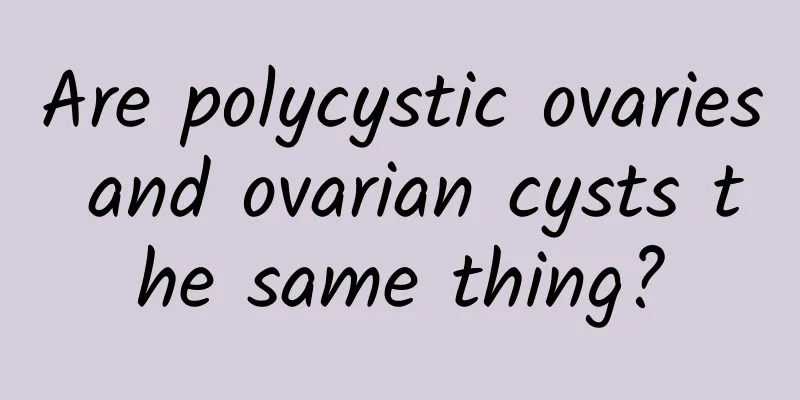Are polycystic ovaries and ovarian cysts the same thing?

|
Speaking of polycystic ovary syndrome and ovarian cysts, these two diseases are the most common types of diseases that occur in the female ovaries. So, are PCOS and ovarian cysts the same thing? Polycystic ovary syndrome It is a common disease caused by complex endocrine and metabolic abnormalities in women of childbearing age, characterized by chronic anovulation (ovulation dysfunction or loss) and hyperandrogenism (excess production of male hormones in women). The main clinical manifestations are irregular menstrual cycles, infertility, hirsutism and/or acne. It is the most common female endocrine disease. In 1935, Stein and Leventhal summarized the four major symptoms of amenorrhea, hirsutism, obesity and infertility, which were called Stein-Leventhal syndrome (SL syndrome). PCOS patients have enlarged ovaries, thickened tunica albuginea, multiple follicles at different stages of development, and luteinized granulosa cells. PCOS is an important risk factor for type 2 diabetes, cardiovascular disease, gestational diabetes, pregnancy-induced hypertension, and endometrial cancer. The clinical phenotype of PCOS is diverse, and the cause is currently unclear. PCOS often shows familial clustering, suggesting the role of genetic factors. Patients often have mothers with irregular menstruation or fathers with premature baldness; premature baldness is the male phenotype of PCOS, and female PCOS and male premature baldness may be determined by the same allele; hyperandrogenism and/or hyperinsulinemia may be genetic characteristics that family members of PCOS patients also suffer from; family analysis studies conducted under different diagnostic criteria often suggest that the inheritance mode of PCOS is autosomal dominant; however, studies using the "single gene-variant expression model" have shown that PCOS is caused by major gene mutations and 50% can be inherited by offspring. Ovarian cysts It is a type of ovarian tumor in a broad sense. It can occur in people of all ages, but is most common in those aged 20 to 50 years. Ovarian tumors are common tumors of the female reproductive system and have various properties and morphologies, namely: unilateral or bilateral, cystic or solid, benign or malignant, among which cystic ones are more common and have a certain proportion of malignant ones. |
<<: Breast cysts can be treated with Chinese medicine dialectics
>>: What should women eat to maintain their ovaries? Four foods are the most beneficial to health
Recommend
Back pain every morning, no pain during the day
If you experience lower back pain every morning, ...
The efficacy and function of Bazhen Tang Gao
Talking about Chinese medicine prescriptions, we ...
Symptoms of hypothyroidism heart disease in the elderly
The proportion of elderly people suffering from h...
What can pregnant women do to enlarge their breasts during pregnancy?
People often say that no matter how small your br...
Early symptoms of cystitis
Among the many urinary system diseases, cystitis ...
What to do if you have a severe cold during early pregnancy
In the early stages of pregnancy, people are very...
How to remove blackheads and whiteheads with acne needle
Acne can be divided into blackheads and whitehead...
What causes low blood pressure?
What is low blood pressure? We all know that high...
What should I do if there is a thread coming out of the episiotomy wound?
During normal delivery, a side incision may be re...
Astragalus treats proteinuria, a small folk remedy for treating a serious disease
If you have kidney disease, one of the most typic...
What is the reason for less menstrual flow and longer duration?
Menstruation is a normal physiological phenomenon...
How to eat Ganoderma lucidum powder
Ganoderma lucidum is ground into powder to fully ...
What to eat when progesterone is low in early pregnancy
Every woman looks forward to the moment her baby ...
How to relieve eye pain caused by welding flash
During the process of using electric welding, the...
The efficacy and function of Banmao Chinese medicine
Mylabris is a kind of insect, also known by many ...









